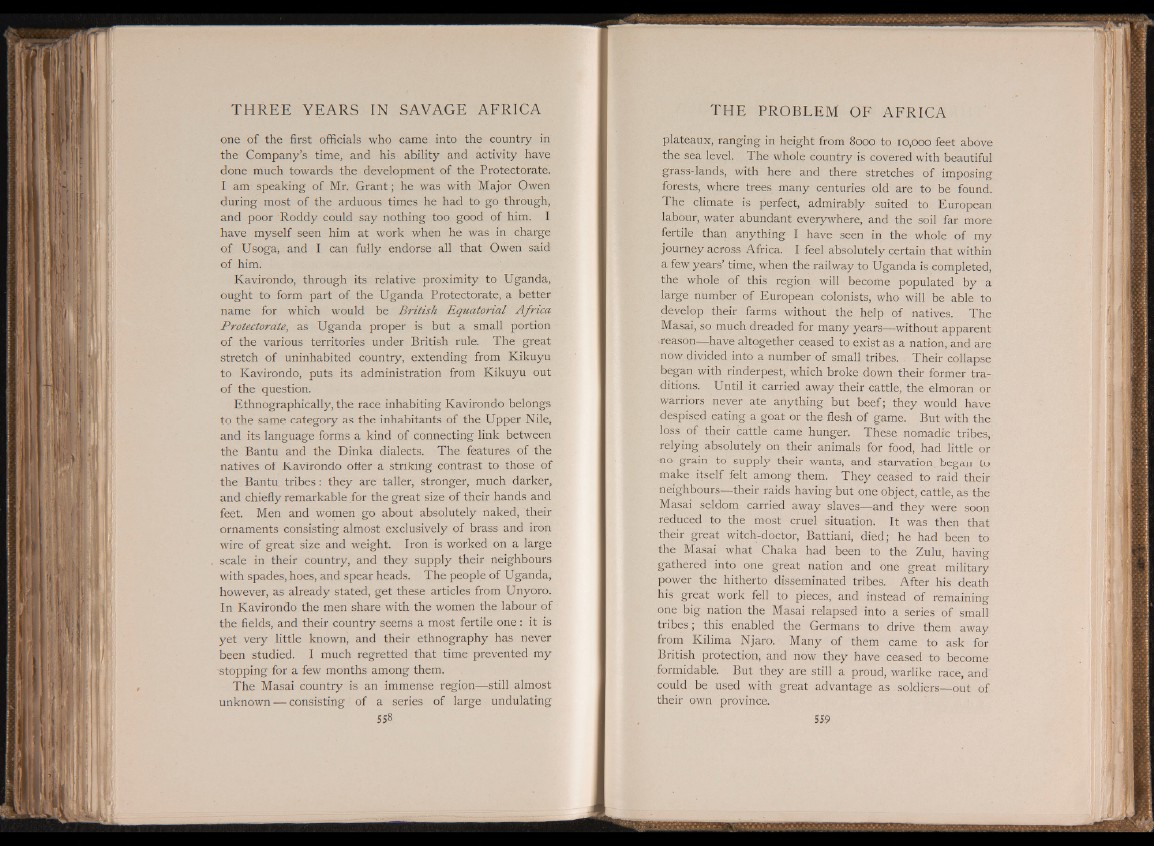
one of the first officials who came into the country in
the Company’s time, and his ability and activity have
done much towards the development of the Protectorate.
I am speaking of Mr. Grant; he was with Major Owen
during most of the arduous times he had to go through,
and poor Roddy could say nothing too good of him. I
have myself seen him at work when he was in charge
of Usoga, and I can fully endorse all that Owen said
of him.
Kavirondo, through its relative proximity to Uganda,
ought to form part of the Uganda Protectorate, a better
name for which would be British Equatorial Africa
Protectorate, as Uganda proper is but a small portion
of the various territories under British rule. The great
stretch of uninhabited country, extending from Kikuyu
to Kavirondo, puts its administration from Kikuyu out
of the question.
Ethnographically, the race inhabiting Kavirondo belongs
to the same category as the inhabitants of the Upper Nile,
and its language forms a kind of connecting link between
the Bantu and the Dinka dialects. The features of the
natives of Kavirondo offer a striking contrast to those of
the Bantu tribes: they are taller, stronger, much darker,
and chiefly remarkable for the great size of their hands and
feet. Men and women go about absolutely naked, their
ornaments consisting almost exclusively of brass and iron
wire of great size and weight. Iron is worked on a large
scale in their country, and they supply their neighbours
with spades, hoes, and spear heads. The people of Uganda,
however, as already stated, get these articles from Unyoro.
In Kavirondo the men share with the women the labour of
the fields, and their country seems a most fertile one: it is
yet very little known, and their ethnography has never
been studied. I much regretted that time prevented my
stopping for a few months among them.
The Masai country is an immense region—still almost
unknown — consisting of a series of large undulating
558
plateaux, ranging in height from 8000 to 10,000 feet above
the sea level. The whole country is covered with beautiful
grass-lands, with here and there stretches of imposing
forests, where trees many centuries old are to be found.
The climate is perfect, admirably suited to European
labour, water abundant everywhere, and the soil far more
fertile than anything I have seen in the whole of my
journey across Africa. I feel absolutely certain that within
a few years’ time, when the railway to Uganda is completed,
the whole of this region will become populated by a
large number of European colonists, who will be able to
develop their farms without the help of natives. The
Masai, so much dreaded for many years—without apparent
'reason—have altogether ceased to exist as a nation, and are
now divided into a number of small tribes. Their collapse
began with rinderpest, which broke down their former traditions.
Until it carried away their cattle, the elmoran or
warriors never ate anything but beef; they would have
despised eating a goat or the flesh of game. But with the
loss of their cattle came hunger. These nomadic tribes,
relying absolutely on their animals for food, had little or
-no grain to supply their wants, and starvation began to
make itself felt among them. They ceased to raid their
neighbours—their raids having but one object, cattle, as the
Masai seldom carried away slaves—and they were soon
reduced to the most cruel situation. It was then that
their great witch-doctor, Battiani, died; he had been to
the Masai what Chaka had been to the Zulu, having
gathered into one great nation and one great military
power the hitherto disseminated tribes. After his death
his great work fell to pieces, and instead of remaining
one big nation the Masai relapsed into a series of small
tribes; this enabled the Germans to drive them away
from Kilima Njaro. Many of them came to ask for
British protection, and now they have ceased to become
formidable. But they are still a proud, warlike race, and
could be used with great advantage as soldiers—out of
their own province.